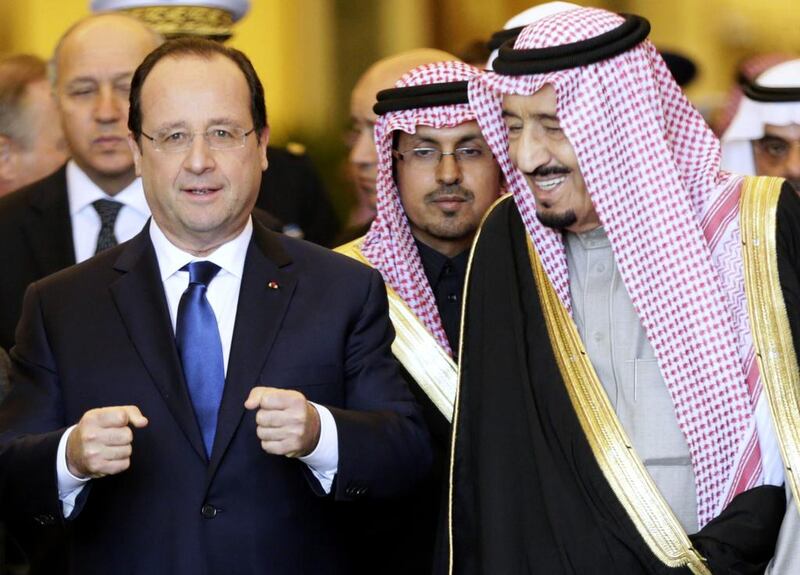Saudi Arabia’s pledge of $3 billion (Dh11 billion) to Lebanon’s army on Sunday is being widely touted as a counterbalance to the influence of the Shiite political and militant group Hizbollah and its Iranian backers.
The move comes amid heightened tensions between Iran and Saudi Arabia, who support opposing sides in Syria’s civil war.
For Lebanon, the aid will provide a much needed boost for its military at a time when the war is spilling over Syria’s borders and threatening neighbouring countries.
For Saudi Arabia, it is a power play meant to counter the weight of its regional rival Iran.
“It is important to note that [the Saudi pledge] is a long-term strategy that reflects the geopolitics of the moment,” said Elias Hanna, a retired general in Lebanon’s armed forces.
Gen Hanna was referring to Saudi Arabia’s reaction to an apparent shift in Western, and particularly United States, policy towards the Middle East.
Riyadh has been critical of Washington’s last-minute decision to refrain from military action against Syria following a chemical weapons attack in the Damascus suburb of Ghouta last August, along with its drive towards an interim deal with Iran over its controversial nuclear programme.
Still, the announcement of the funds is likely to be well received by Western powers, which themselves provide funding to Lebanon’s armed forces. Since 2006, the US has provided Lebanon’s armed forces $1bn, an amount far exceeded by the Saudi pledge.
The move also appears to indicate closer ties between the French president, Francois Hollande, and Saudi Arabia’s King Abdullah, who met in Riyadh on Sunday for talks that included the escalating tensions in Syria and Lebanon. Lebanon’s president, Michel Suleiman, announced the Saudi aid later the same day, and elaborated a few hours later that the funds would be used to buy “newer and more modern weapons” from France.
Emile Hokayem, a Middle East analyst at the International Institute for Strategic Studies, said that rather than a dramatic shift in relations, the deal was part of a longstanding policy of cooperation between Riyadh and Paris.
“Saudi Arabia’s flirtation with France is not circumstantial – it’s longstanding,” Mr Hokayem said, noting that Saudi displeasure with the US was a contributing – but not a decisive – factor.
France has helped Saudi Arabia on numerous occasions in the past, helping to retake the Grand Mosque of Mecca in 1979 from a radical Sunni group and providing intelligence to Saudi forces fighting Houthi rebels in Yemen in 2009, Mr Hokayem said.
Mr Hokayem also said “it is important to note that the Saudi grant is being used to fund a Lebanese institution, rather than a particular militia group”, a reference to Iran’s financial backing of Hizbollah.
It remains to be seen how the aid will be transferred. The sum is almost double the army’s 2012 budget allocation of $1.7bn, according to the Stockholm International Peace Research Institute. Details have also yet to emerge regarding when the money will arrive – a process that could be delayed by Lebanon’s heavy bureaucracy and its current absence of a government – and how it will be allocated.
A major concern is that with the Saudi pledge viewed as a direct challenge to Hizbollah, it risks raising sectarian and political tensions further in a country that has seen waves of violence and political assassinations linked to the war in Syria.
This was evidenced most recently on December 27, when a former Lebanese finance minister and prominent critic of the Syrian regime, Mohammed Chatah, and at least five others were killed by a car bomb in central Beirut.
Many within Lebanon’s pro-Saudi March 14 alliance, including its leader Saad Hariri, said that they held Hizbollah responsible for the attack.
However, while some on Hizbollah-affiliated media outlets have raised objections to the aid, including the Al Akhbar newspaper’s editor-in-chief, Ibrahim Al Amin, the majority of Lebanese favour a strong national army and will at least tacitly support the move, according to Dr Fadi Assaf, a consultant at the Beirut-based Middle East Strategic Perspectives consultancy.
“Even if some are voicing certain criticisms, it is not in anybody’s interest to reject” the pledged funds, he said.
foreign.desk@thenational.ae





